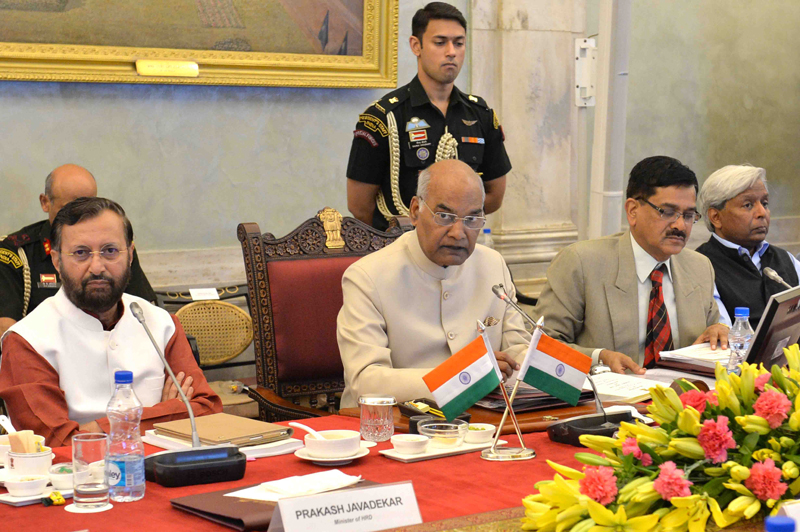ADDRESS BY THE PRESIDENT OF INDIA, SHRI RAM NATH KOVIND AT THE CLOSING SESSION OF THE MEET OF VICE-CHANCELLORS OF CENTRAL UNIVERSITIES
Rashtrapati Bhavan : 02.05.2018

1. Today, we heard Vice-Chancellors of 24 central universities present here on issues concerning promotion of research and innovation in your campuses. This meeting was convened by me to understand, discuss and, where possible, to find quick solutions to the problems faced by you with regards to your initiatives and plans focussed on research and innovation.
2. From the deliberations today, it appears that the universities are making noteworthy contributions to research in different fields ranging from basic science to humanities. However, as we have heard, there are areas in which you are facing challenges. We need to acknowledge those challenges and then address them through a conscious, clear and systematic approach.
3. In many cases, these challenges cannot be resolved by the universities alone and they need institutional and long term support of the Government. In this regard, I appreciate the presence of the Minister for HRD, as well as the Minister of State and other officers from the Ministry. I also thank the Ministry of Science and Technology and the University Grants Commission for their contribution in today’s meeting. Be it issues concerning funding of research, setting up of top-class labs or incubation centres, facilitation for filing patents or other issues, I am sure that the Ministers as well as the concerned officials have noted them all and would follow up on those through concrete actions.
4. However, a lot of possible improvements lie fully within your own grasp. As Vice-Chancellors of these universities, it is for you to design and impose a regimen that will ensure that our universities continue to improve and provide meaningful education for nation building. Simple steps like strictly adhering to your Academic Calendar for admissions, conduct of classes, examinations, declaration of results and awarding of degrees at convocations and so on, can be the starting point on the journey towards excellence. From the presentations made earlier, I find that in most of the cases you are regular till the stage of university results but get slow when the stage for holding convocation arrives. In my view, your one year academic calendar is incomplete till convocation is held and degrees are distributed. It is important that all of you hold your convocations regularly and on time.
5. It is observed that filling up of faculty vacancies is a challenge faced by many of you. This is a common issue faced by several of our higher education institutes and we need to find lasting solutions to address it.
6. There are some steps that you can take to address the shortage of faculty in your universities. For instance, you can develop a robust visiting faculty program, use online teaching tools, re-employ retired professors. Also, planning for vacancies well in advance can help. Besides, the ability of each university to attract talent also depends upon its own reputation and quality. So compete to become the best among your peersand your success at hiring and retaining talent will automatically improve.
7. You must embrace technology in a big way to augment your research and teaching resources as well as your reach beyond your physical campuses. All of you must invest in Massive Open Online Courses (or MOOC) to enhance your capacities. Through adoption of technology you can minimise your carbon footprint. For instance, you can drastically reduce use of paper by digitising your class calendars, notes, examinations, and assignments.
8. Universities should play a leading role in addressing the specific challenges faced by our nation. Many of these challenges require creative and innovative solutions. It is your paramount duty to ensure that your campuses emerge as spaces that nurture free expression and ideas, where experimentation is encouraged and failure is not ridiculed but is seen as learning. In addition, universities should become the conduits for exposing students to the problems faced by our people, our nation, cities, towns and villages.
9. Through such exposure coupled with a push towards creative and innovative thinking, universities can prepare its students to take up research and innovation projects contributing to national development. For instance, while doing ‘Basic Research’ in science is important, so too is doing ‘Applied Research’ that can solve real-life specific problems, say of our farmers. And while theory lectures in classroom are important for students, so too are field projects in nearby villages and towns. We need to introspect whether we are doing enough in this regard. All of you should make a conscious effort to integrate community-oriented projects as part of your curriculum.
10. Today, we have discussed problems but we have also made some progress in identifying the way forward. I am sure the Ministry of HRD, led by the Minister, Shri Prakash Javadekar, will make all efforts to resolve these problems in a time-bound manner. I propose that in approximately six months, perhaps in December, we meet again to review progress.
11. With those words, I would like to thank you for participating in the discussions with full honesty. I could sense that all of you are highly motivated to make your universities institutions of excellence. I wish you and wish your universities all the best for the future.